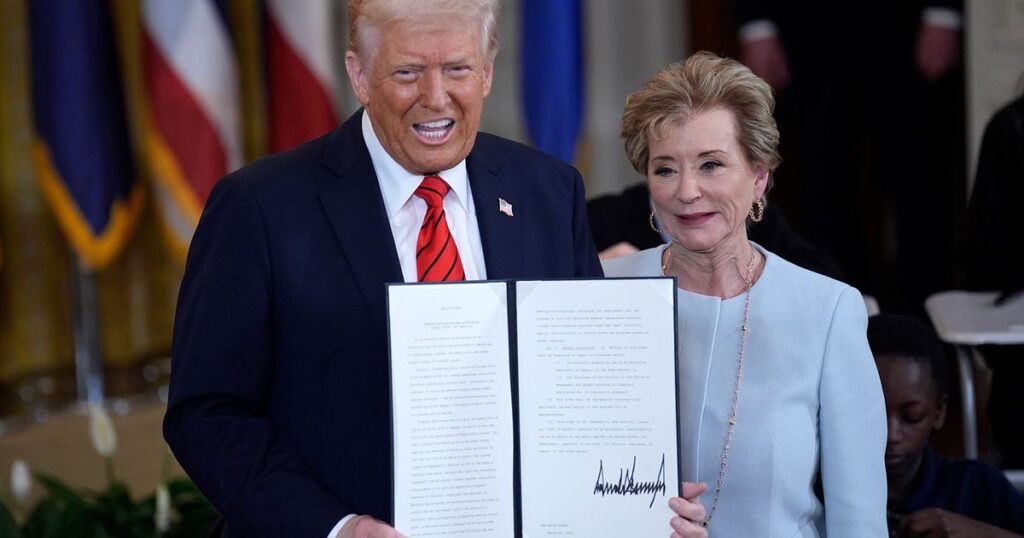Whereas volunteering this spring at a center faculty in Washington, D.C., I watched a science trainer chat together with her latest pupil, who had just lately arrived from Paris. The trainer started explaining the rules of an upcoming project, using hand gestures and some well-intentioned Spanish phrases. The scholar, appreciative although a bit bewildered, listened intently as her trainer endeavored to speak throughout their language barrier.
The proper to equal training entry, no matter native language or any issue of id, has been a core tenet of American values because the Supreme Courtroom determined Brown v. Board of Education in 1954, although study after study exhibits that true training equality has but to be realized.
President Donald Trump’s Executive Order 14224, “Designating English because the Official Language of the US,” stands in direct contradiction to those values.
In addition to declaring English the nation’s official language, Trump’s order revokes President Invoice Clinton’s Executive Order 13166, “Enhancing Entry to Companies for Individuals with Restricted English Proficiency (LEP).” Clinton’s order, deriving its authority from Title VI of the Civil Rights Act, outlined linguistic partiality as discrimination on the premise of nationwide origin and directed federal businesses to “implement a system by which LEP individuals can meaningfully entry” essential companies.
Since signing the order on March 1, the Trump administration has begun withholding federal funds supporting emergent bilingual college students. Ileana Najarro, writing for Schooling Week, explains that revoking Clinton’s order removes the requirement for federally funded faculties to help emergent bilingual college students in accessing faculty assets. Which means faculties might terminate their interpretation and translation services. By eliminating these protections, the Trump administration has jeopardized the nation’s dedication to equal training entry.
Efforts to take away protections for bilingual audio system are as outdated because the nation itself. Officers at residential faculties punished Indigenous kids for talking their native languages. In a 1919 letter, President Roosevelt wrote, “We have now room for however one language right here,” criticizing the nation’s evolution into what he referred to as “a polyglot boardinghouse.” In 2023, greater than a century later, then-senator JD Vance introduced a invoice to designate a federal official language and require English proficiency for naturalization.
English-language fluency is significant for college students to reach U.S. faculties and workplaces. Combating to supply equal alternatives for emergent bilingual college students ought to subsequently stay a nationwide crucial. As Pooja Reddy Nakamura, a senior researcher for the American Institute of Analysis, concluded, “Throwing kids off the linguistic deep finish and attempting to immerse them in English earlier than they study their very own language invitations literacy failure in each English and their very own languages.”
Native language literacy isn’t merely a steppingstone to English literacy; a pupil’s ensuing bilingualism presents them essential benefits. The Middle for Utilized Linguistics describes multilinguals as possessing “each a private and societal asset” that “strengthen[s] our place” in diplomatic relations and the worldwide economic system.
Furthermore, supporting multilingualism brings communities collectively. Each time a household’s efforts to help their kids are snubbed as a result of they lack English fluency, or an emergent bilingual pupil is deemed unintelligent, a wedge drives deeper into the communities round our public faculties. Native language valuation isn’t solely academically and economically useful; it’s an act of group constructing and an affirmation of our nation’s egalitarian beliefs.
For these causes, state departments of training and faculty districts should shield college students’ and households’ rights to translation companies and language-learning help. To make certain, policymakers preventing for equal training entry have finite political capital, and faculties have restricted funds to allocate to those endeavors. Supporting emergent bilingual college students is one objective of innumerable essential fights, however it have to be thought of simply as pressing as different up to date civil rights points.
On that spring day on the center faculty, I later approached the scholar and struck up a dialog in French, my phrases laced with a thick American accent however welcoming all the identical. Her face lit up, and although we solely exchanged a couple of sentences, I believe our interplay left us each feeling slightly extra tethered to the college’s group, certain collectively by language.
Multilingualism is a present to college students, communities and our nation. Allow us to struggle to guard it.

